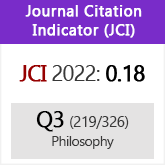Et tu, Hobbe? An exploration of the concept of political conspiracy
DOI:
https://doi.org/10.3989/isegoria.2021.64.18Keywords:
Hobbes, Conspiracy, Collective action, ShakespeareAbstract
In this article, we will examine a hermeneutical problem raised in Chapter XI of Hobbes’s Leviathan. Namely: Why does the author refrain from describing the attack led by Brutus against Julius Caesar as the result of a conspiracy? Why instead of talking about the collective action of an organized group does he refer to a “multitude of actions performed by a multitude of men”? In order to unravel this paradox, we will analyze the category of “faction” developed by Hobbes. After confirming that the republican conspiracy is easily explained by this concept and that it adapts poorly to that of an irregular crowd, we shall inquire if the key to this curious reading can be found in Hobbes’s sources. While Plutarch is unequivocal about the conspiratorial status of the group, Shakespeare does indeed problematize the matter. Correspondingly, we will argue that Hobbes may have taken into account Shakespeare’s treatment for his denial of the collective nature of the organized action against Caesar.
Downloads
References
Alexander, G., "Prosopopoeia: The speaking figure", en Renaissance Figures of Speech, G. Alexander & K. Ettenhuber (eds.), Cambridge, CUP, 2007, 97-114. https://doi.org/10.1017/CBO9780511988806.013
Aubrey, J., Brief Lives, chiefly of Contemporaries, set down by John Aubrey, between the years 1669 and 1696, Vol. I., A. Clark (ed.), Oxford, OUP, 1898.
Borges, J. L., Obra Poética, Madrid, Alianza, 1975. Brito Vieira, M., The Elements of Representation in Hobbes: Aesthetics, Theatre, Law, and Theology in the Construction of Hobbes's Theory of the State, Leiden, Brill, 2009.
Carpi, D., "Caesar's Body in Shakespeare's Julius Caesar: Sacralization and De-sacralization of Power", en Pólemos, 9 (2), 2015. https://doi.org/10.1515/pol-2015-0019
Chanteur, J., "Note sur les notions de 'Peuple' et de 'Multitude' chez Hobbes", en Hobbes-Forschungen, R. Koselleck & R. Schnur (eds.), Berlin, Dunker & Humblot, 1969, 223-235.
Colclough, D., "Talking to the animals: persuasion, counsel and their discontents in Julius Caesar" in Shakespeare and Early Modern Political Thought, D. Armitage, C. Condren and A. Fitzmaurice (eds.), Cambridge, CUP, 2009, 217-233. https://doi.org/10.1017/CBO9780511635328.012
Condren, C., Argument and Authority in Early Modern England: The Presupposition of Oaths and Offices, Cambridge, CUP, 2006. https://doi.org/10.1017/CBO9780511490477 PMid:17075371
Cooren, F., Action and Agency in Dialogue: Passion, Incarnation and Ventriloquism, Amsterdam/Philadelphia, John Benjamin Publishing Co., 2011. https://doi.org/10.1075/ds.6
Copp, D., "Hobbes on Artificial Persons and Collective Actions" in The Philosophical Review, 89 (4), 1980, 579-606. https://doi.org/10.2307/2184737
De Man, P., The Rhetoric of Romanticism, New York, Columbia UP, 2000.
Girard, R., "Collective Violence and Sacrifice in Shakespeare's Julius Caesar" in Salmagundi, 88/89, 1990, 399-419.
Greene, G., "'The Power of Speech/To Stir Men's Blood': The Language of Tragedy in Shakespeare's Julius Caesar", en Renaissance Drama, 11, 1980. https://doi.org/10.1086/rd.11.41917179
Hobbes, T. Answer to the Preface of Gondibert in The English Works of Thomas Hobbes, Vol. IV, Sir William Molesworth (ed.), London, 1841.
Hobbes, T. The History of the Grecian War written by Thucydides in The English Works of Thomas Hobbes, Vols. VIII-IX, Sir William Molesworth (ed.), London, 1844.
Hobbes, T. The Elements of Law Natural and Politic. Part I: Human Nature; Part II: De Corpore Politico: with Three Lives, J.C.A. Gaskin (ed.), Oxford, OUP, 1994.
Hobbes, T. Leviathan, R. Tuck (ed.), Cambridge, CUP, 1996. https://doi.org/10.1017/CBO9780511808166
Hobbes, T. A Dialogue Between a Philosopher and a Student, of the Common Laws of England in The Clarendon Edition of the Works of Thomas Hobbes, Vol. XI, A. Cromartie and Q. Skinner (eds.), Oxford, OUP, 2005.
Hobbes, T. Behemoth, or The Long Parliament, in The Clarendon Edition of the Works of Thomas Hobbes, Vol. X, P. Seaward (ed.), Oxford, OUP, 2010. https://doi.org/10.1093/actrade/9780198248712.book.1
Hobbes, T. Elementos filosóficos. Del Ciudadano, A. Rosler (trad.), Buenos Aires, Hydra, 2011.
Hobbes, T. Leviathan, 3 Vols., in The Clarendon Edition of the Works of Thomas Hobbes, Vols. III, IV & V, N. Malcolm (ed.), Oxford, OUP, 2012. https://doi.org/10.1093/oseo/instance.00025178
Hull, G., Hobbes and the making of modern political thought, Londres, Continuum, 2011.
Kearney, C., "The Nature of an Insurrection: Shakespeare's Julius Caesar", en Studies: An Irish Quarterly Review, 63 (250), 1974.
Kutz, C., Complicity, Cambridge, CUP, 2000. https://doi.org/10.1017/CBO9780511663758
Lawson, G., "An Examination of the Political Part of Mr. Hobbes, his Leviathan", en Early Responses to Hobbes, Vol. II, G. Rogers (ed.), London, Routledge/Thoemmes, 1996 [1657].
Manin, B., The Principles of Representative Government, Cambridge, CUP, 1997. https://doi.org/10.1017/CBO9780511659935 PMid:9324042
Martinich, A. P., The two gods of Leviathan: Thomas Hobbes on Religion and Politics, Cambridge, Cambridge University Press, 1992. https://doi.org/10.1017/CBO9780511624810
Muir, K., The Sources of Shakespeare's Plays, London, Routledge, 2005.
Pitkin, H., The Concept of Representation, Berkeley, University of California Press, 1972.
Plutarco, Shakespeare's Plutarch: being a selection from the lives in North's Plutarch which illustrate Shakespeare's plays, Rev. Walter W. Skeat (ed.), London, Macmillan and Co., 1875.
Plutarco, Brutus, en Lives, Vol. VI, B. Perrin (ed.), Cambridge, MA, Harvard UP, 1918.
Plutarco, Caesar, en Lives, Vol. VII, B. Perrin (ed.), Cambridge, MA, Harvard UP, 1919.
Quintiliano, Institutio Oratoria, H.E. Butler (ed.), Cambridge, MA, Harvard UP, 1922.
Rilla, J., El Leviatán como Prosopopeya: Hacia una nueva teoría del conflicto en Hobbes, Buenos Aires, Teseo Press, 2019.
Rosler, A., "El enemigo de la república" in Elementos filosóficos. Del ciudadano, Buenos Aires, Hydra, 2011, 9-101
Rousseau, J. J., Du Contrat Social, ou Principes du Droit Politique, Vol. I, in Collection complète des oeuvres, 1780-1789, 17 Vols., Du Peyrou et Moltou (eds.), Genève, J.M. Gallanar, 2004.
Runciman, D., "What Kind of Person is Hobbes's State? A Reply to Skinner", The Journal of Political Philosophy, 8 (2), 2000, 268-278. https://doi.org/10.1111/1467-9760.00102
Shakespeare, W., Julius Caesar, en The Cambridge Dover Wilson Shakespeare, Vol. 15, Cambridge, CUP, 2009. https://doi.org/10.1017/CBO9780511704215
Simpson, J. & Weiner, E. (eds.), Oxford English Dictionary, 2nd Edition on CD-ROM, Oxford, OUP, 2009.
Skinner, Q., "Hobbes and the studia humanitatis", en Visions of Politics, Vol. III, Cambridge, CUP, 2002a.
Skinner, Q., "Classical Liberty and the Coming of the English Civil War", en Gelderen, M.v. & Skinner, Q. (eds.), Republicanism, Vol. II, Cambridge, CUP, 2002b. https://doi.org/10.1017/CBO9780511490767.003 PMid:12220169
Skinner, Q., "Rhetorical Redescription and its Uses in Shakespeare", en From Humanism to Hobbes, Cambridge, CUP, 2018, 89-117.
Shapiro, I., Individual Rights in Modern Liberal Thought: A Realist Account, Tesis Doctoral, Yale University, 1983.
Talaska, R., The Hardwick Library and Hobbes's Early Intellectual Development, Charlottesville, Philosophy Documentation Center, 2013.
Turner, H., The Corporate Commonwealth: Pluralism and Political Fictions in England, 1516-1651, Chicago, UCP, 2016. https://doi.org/10.7208/chicago/9780226363493.001.0001
Velz, J., "Undular Structure in Julius Caesar" in The Modern Language Review, 66 (1), 1971, 21-30. https://doi.org/10.2307/3722464
Virno, P., A Grammar of the Multitude, Nueva York, Semiotext( e), 2004.
Willbern, D., "Constructing Caesar", en Julius Caesar. New Critical Essays, H. Zander (ed.), London, Routledge, 2005.
Wills, G., Rome and Rhetoric. Shakespeare's Julius Caesar, New Haven, Yale, 2011.
Zander, H., "Julius Caesar and the Critical Legacy", en Julius Caesar. New Critical Essays, London, Routledge, 2005, 3-55.
Zandvoort, R., "Brutus's Forum Speech in Julius Cæsar", en The Review of English Studies, 16 (61), 1940. https://doi.org/10.1093/res/os-XVI.61.62
Published
How to Cite
Issue
Section
License
Copyright (c) 2021 Consejo Superior de Investigaciones Científicas (CSIC)

This work is licensed under a Creative Commons Attribution 4.0 International License.
© CSIC. Manuscripts published in both the printed and online versions of this Journal are the property of Consejo Superior de Investigaciones Científicas, and quoting this source is a requirement for any partial or full reproduction.All contents of this electronic edition, except where otherwise noted, are distributed under a “Creative Commons Attribution 4.0 International” (CC BY 4.0) License. You may read here the basic information and the legal text of the license. The indication of the CC BY 4.0 License must be expressly stated in this way when necessary.
Self-archiving in repositories, personal webpages or similar, of any version other than the published by the Editor, is not allowed.














